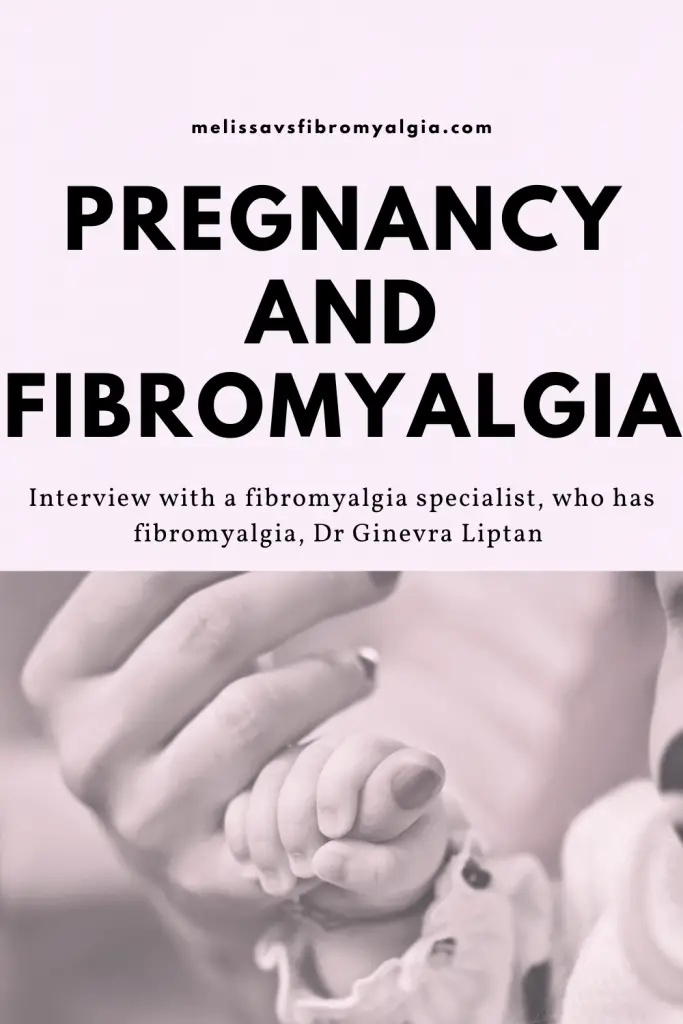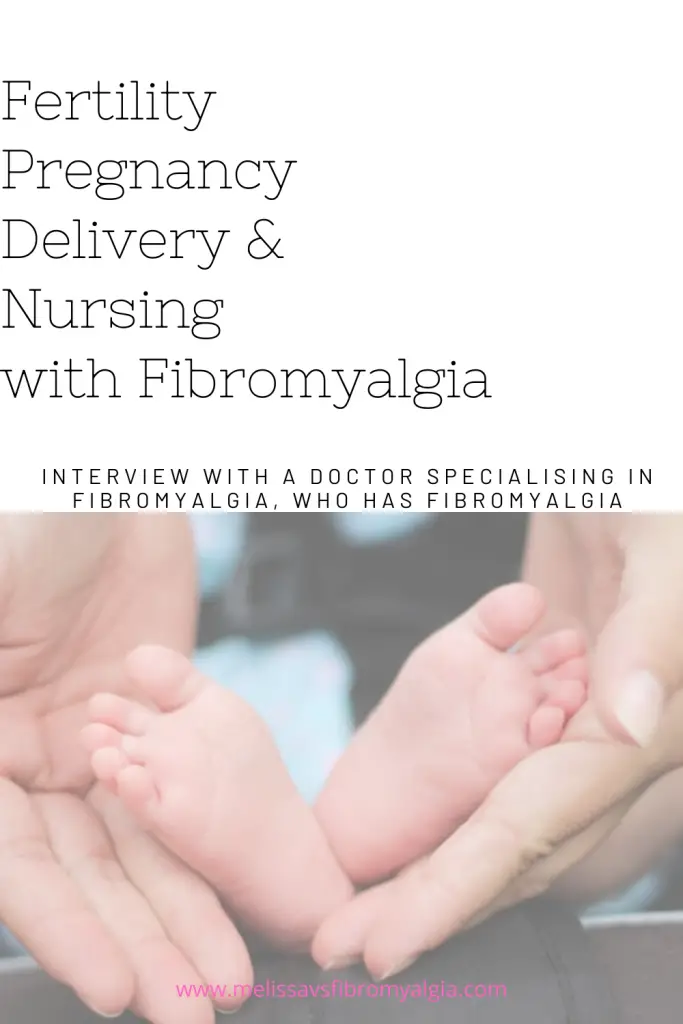Last Updated on October 19, 2021 by melissanreynolds
Pregnancy and fibromyalgia is one of those weird information voids. Having been pregnant three times, and gathering all of the (limited) research together as best as I can for the past several years, something was still lacking. This blog post is the gold mine I was missing. A doctor who has fibromyalgia and has experienced pregnancy herself!
I am so thankful to be able to share this interview with Doctor Ginevra Liptan, a fibromyalgia specialist, who has fibromyalgia. I love her work and have followed it for a long time, so I was super excited when I got up the courage to ask her to do an interview for this blog and she said yes.

About Dr Liptan
Ginevra Liptan, M.D. is a graduate of Tufts University School of Medicine, board-certified in internal medicine, and trained in functional medicine, a holistic approach that blends both western and alternative medicine. After developing fibromyalgia as a medical student, Dr. Liptan spent many years using herself as guinea pig to find successful treatments, and has fine-tuned her approach by treating thousands of patients.
She’s one of the few clinical specialists in the world to focus solely on fibromyalgia, and directs The Frida Center for Fibromyalgia in Portland, Oregon. She is the author of The FibroManual: A Complete Fibromyalgia Treatment Guide for You and Your Doctor and The Fibro Food Formula: A Real-Life Approach to Fibromyalgia Relief.
In your experience, do you believe fertility is an issue for those with fibromyalgia?
Clinically my patients with fibromyalgia do seem to have more fertility issues, and I think there are a few reasons for this 1) higher levels of inflammation 2) hormone alterations caused by the chronic fight-or flight response and 3) myofascial restrictions around the uterus and fallopian tubes. All of these factors can have a negative influence on fertility.
However one study from Turkey found no difference in pregnancy or birth rates in women with fibromyalgia compared to healthy women Most of my patients have ultimately conceived even if the road to conception was a bit bumpier or longer.
Most of my patients have ultimately conceived even if the road to conception was a bit bumpier or longer.
Do you have recommendations for women prior to trying to conceive with fibromyalgia?
I encourage my patients to boost their nutritional status as much as they can prior to conception, as growing a fetus takes a lot of nutrients! In particular I recommend checking iron, B12, Vit. D levels and supplementing to ensure these nutrients are all at optimal levels.
And while you are doing bloodwork I also check for the MTHFR genetic mutation. This sounds scary, but it simply reflects how efficiently your body can activate and use folic acid. If you have this mutation you can counteract the inefficiency by simply supplementing with an already activated form of folic acid called methylfolate or L-5-MTHF. Both Thorne Research and Pure Encapsulations, my two favorite supplement companies, offer great prenatal vitamins with this form of folic acid.
To optimize fertility in fibromyalgia we need to reverse the three inhibiting factors I mentioned. First reduce inflammation by making dietary changes to avoid triggering foods, or adding a medication like low dose naltrexone (see below). Lowering inflammation can improve hormone balance, as can supporting our adrenals, because any component of adrenal burnout will drag down all the other hormone systems. Learn more about treating adrenal burnout in my blog.
Finally myofascial release therapy (www.myofascialrelease.com) can break up the myofascial restrictions around the uterus and fallopian tubes.
Do you have any general recommendations for women during pregnancy with fibromyalgia?
The most common question I get asked is “ Are my fibromyalgia symptoms going to get worse during pregnancy?” and what I tell patients is most most often the answer is yes. In fact in a study of 26 women with fibromyalgia who had a total of 40 pregnancies, all except one women described a worsening of their symptoms during pregnancy, with the third trimester being the worst. The good news is that none of these women reported fibromyalgia having a negative outcome on their pregnancy outcome or on the health of the baby.
I personally found my fibromyalgia symptoms were worse during pregnancy. I do have some patients- especially those with both fibromyalgia and an inflammatory/autoimmune illness like rheumatoid arthritis or lupus, that feel much better during pregnancy. Pregnancy does alter immune system functioning in a way that can give a temporary remission for autoimmune illnesses.
As far as managing symptoms during pregnancy, fatigue, low back and pelvic pain are common in most pregnant women. In fact one study found that 26% of healthy pregnant without fibromyalgia had widespread pain and fatigue severe enough to be diagnosed with fibromyalgia!
Another study found that 60% of healthy pregnant women reported fatigue during the last trimester and 75% complained of disturbed sleep.
So the addition of even more fatigue and pain due to pregnancy can be extremely challenging when added on to what someone with fibromyalgia is already dealing with. It is especially hard because in pregnancy our pain management toolbox shrinks due to medication safety concerns.
This is where the importance of self-care comes in– saying “no” and protecting your time, pacing activities and taking good care of your muscles with gentle stretching and movement. Gentle prenatal yoga- whether in classes or videos at home- and myofascial release self-treatment can be a life-saver for lowering back and pelvic pain during pregnancy.
Are your food recommendations (from The Fibro Food Formula book) any different during pregnancy and nursing?
Generally my food recommendations are the same during pregnancy such as eating frequent protein and trying to avoid foods that you know you don’t tolerate still apply. But pregnancy is also not a time to try any strict diets or major dietary changes and due to nausea you may need to eat more carbs compared to protein. And pregnancy food cravings can be fierce. So my recommend is to eat what makes your pregnant body feel good. And if the baby demands donuts, eat the donuts!
Do you have any experience using low dose naltrexone during pregnancy? Do you have any resources/tips/ideas around this?
Side note: I (Melissa) personally used LDN in my third pregnancy and it was such a better experience for me (my first two dramatically worsened my pain and fatigue levels) and I am coping with the first year better than before and have managed to breastfeed successfully where I couldn’t maintain supply previously. I could never find any place to share my experience (like a register) or others experiences. I based my choice off Dr Phil Boyle’s work.
Among practitioners that prescribe LDN it is considered safe in pregnancy, and in fact is used as a treatment for fertility. As you mentioned, anecdotally Dr. Phil Boyle has found LDN safe in his clinical practice.
There haven’t been any studies looking at LDN in pregnancy. In animal studies for naltrexone, the safety data is conflicting, with some showing that naltrexone had negative effects on growth and behavior and others showing positive effects.
The few human studies we do have looked at outcome of pregnancies in women taking higher doses of naltrexone as treatment for opioid abuse. These studies showed slightly higher rate of pregnancy complications, but the dosage of naltrexone is important to keep in mind.
We know that low-dose naltrexone has very different physiologic effects on the body than high doses so can’t assume that LDN would have the same effects in pregnancy as full dose. Also the patient populations in these studies have a history of drug abuse which puts them at a higher risk of pregnancy complications and poor prenatal care.

Have you come across any good guidelines for delivery/labor with fibromyalgia?
I have not found any good guidelines, but here is what I usually tell patients- and I admit it may be biased by my own experience, which is to have a low threshold to get an epidural. In fibromyalgia we experience so much pain over our lifetime, if there is a chance to experience a pain-free delivery, then I say go for it.
Of course, many women with fibromyalgia have natural labors with no epidural and do beautifully. Our bodies really are built to do this! But I personally had a brutal pregnancy with severe hyperemesis gravidarum with daily nausea and vomiting for 9 months that required multiple hospitalizations. So when it came time for delivery I happily got an epidural and had an enjoyable and pain-free birth. But of course, epidurals have risks so this is a very individual decision
In fibromyalgia we experience so much pain over our lifetime, if there is a chance to experience a pain-free delivery, then I say go for it.
In your work have you found nursing to be difficult for people with fibromyalgia? Do you have any tips?
I do see nursing being an issue for women with fibromyalgia. For some women the challenge is milk production. I think the chronic fight or flight response we experience in fibromyalgia affects the hormones of lactation.
The other issue is pain caused by awkward or prolonged positioning associated with nursing. One study examined this issue and in interviews with 9 women with fibromyalgia found frequent reports of fatigue and pain interfering with the breastfeeding process and concerns about insufficient milk supply.
I initially had no issues with milk supply but at 3 months I had to go back to a very stressful hospital rotation and my milk supply dried up really quickly and I was not successful at pumping and had to quickly transition my daughter to formula.
Want to read more about breastfeeding with fibromyalgia? Check out this post.
Do you have anything else you’d like to say about women either trying to conceive, pregnancy, nursing or parenting with fibromyalgia?
Well the other question I get asked the most is whether having fibromyalgia increases the risk of birth defects. The short answer is no it does not.
The longer answer is that having fibromyalgia does slightly increase risk of intrauterine growth restriction and smaller birth weight babies. This is likely due to the effects of the overactive fight or flight (stress response) as it is also seen in women with pregnancies experiencing external stressors such as war, poverty and intimate partner violence. But in those cases also see higher rates of preterm or early delivery, and that is not seen in women with fibromyalgia.
Well the other question I get asked the most is whether having fibromyalgia increases the risk of birth defects. The short answer is no it does not.
Dr Liptan has two highly recommended books that you might like to check out
Affiliate notice: Please note that some of my links are affiliate links and if you make a purchase using one of these links I may make a commission at no extra cost to you.
The FibroManual – this is my go-to, I recommend it to everyone with fibromyalgia!
The Fibro Food Formula – the best book about nutrition and fibromyalgia, it takes into account how hard it is to enact some of the general recommendations out there and helps us to make the best choices possible.
If you want an actual book about pregnancy and fibromyalgia, mine is only one of two existing!
Thanks for reading this post. Please feel free to share it with those who need to read it. Let’s close this knowledge gap!
If you want community to do considering, trying to conceive, pregnancy, nursing and parenting with fibromyalgia – come and join our team over in the Facebook group.


2 thoughts on “Pregnancy and Fibromyalgia: An Interview with Doctor Ginevra Liptan Fibromyalgia Specialist”